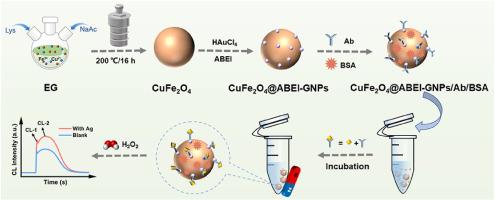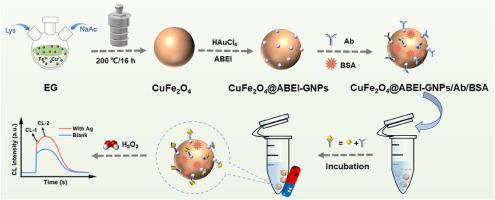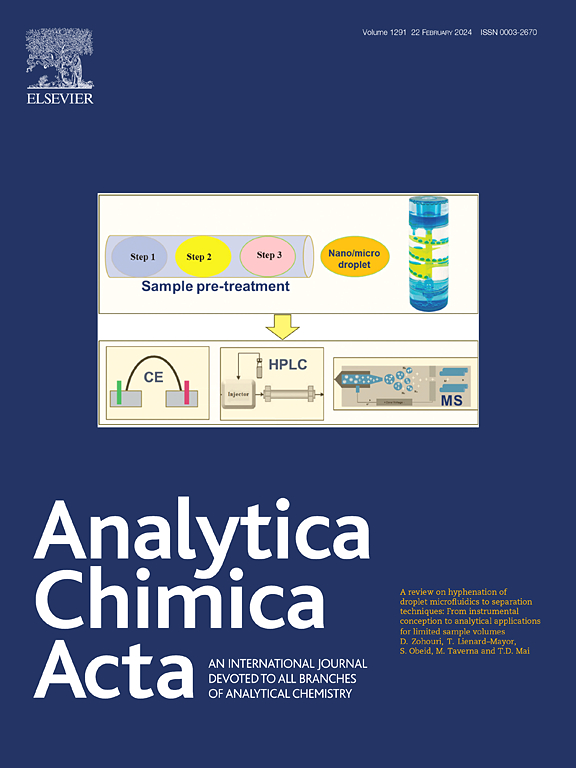Label-free differential chemiluminescent immunosensor based on magnetic nanoparticles CuFe2O4@ABEI-GNPs with dual catalytic sites
IF 5.7
2区 化学
Q1 CHEMISTRY, ANALYTICAL
引用次数: 0
Abstract
Background
Cancer has become one of the main causes of death globally. The level of tumor markers in serum is correlated with the occurrence of cancer. Carcinoembryonic antigen (CEA) is the most commonly utilized tumor marker for cancer detection. Recently, various analytical technologies have been reported to detect biomarkers. However, developing a simple, sensitive, and noninvasive approach for CEA detection remains challenging in cancer diagnosis. Consequently, there is an urgent need for researchers to carry out innovative approaches for CEA detection.
Result
In this work, copper ferrite nanoparticles (CuFe2O4 NPs) with excellent dispersity and fascinating magnetism have been successfully synthesized. To get CuFe2O4@ABEI-GNPs, ABEI-gold NPs (ABEI-GNPs) were generated on the surface of CuFe2O4 NPs by using N-(4-Aminobutyl)-N-ethylisoluminol (ABEI) as a mild reduction reagent to reduce chloroauric acid tetrahydrate (HAuCl4·4H2O). The CuFe2O4@ABEI-GNPs exhibited a superior chemiluminescence (CL) performance compared with CuFe2O4@ABEI NPs, which was attributed to the synergistic catalysis effects of CuFe2O4 NPs and GNPs. Interestingly, two unique CL emission peaks were observed in the kinetic curve of CuFe2O4@ABEI-GNPs. Furthermore, it was found that the kinetic curve could be regulated by the pH of hydrogen peroxide (H2O2) and a possible CL mechanism was proposed. Owing to the favorable CL properties of CuFe2O4@ABEI-GNPs, a label-free differential immunosensor was fabricated for CEA monitoring using the intensity difference between CL-1 and CL-2. The developed immunosensor exhibited a wide linear range from 0.1 to 5000 pg/mL, and a low detection limit of 0.05 pg/mL.
Significance and novelty
The immunosensor was capable of determining CEA in real samples with simple operation, high accuracy, and good sensitivity. This study introduces a novel approach for developing CL functionalized materials, which have broad application potential in bioassays. The proposed differential method could serve as a novel tool for determining CEA in the diagnosis of clinical cancer.


基于具有双催化位点的磁性纳米粒子 CuFe2O4@ABEI-GNPs 的无标记差异化学发光免疫传感器
背景癌症已成为全球主要死亡原因之一。血清中肿瘤标志物的水平与癌症的发生相关。癌胚抗原(CEA)是最常用于检测癌症的肿瘤标志物。近来,各种检测生物标记物的分析技术层出不穷。然而,开发一种简单、灵敏、无创的 CEA 检测方法在癌症诊断中仍具有挑战性。本研究成功合成了具有优异分散性和迷人磁性的铜铁氧体纳米粒子(CuFe2O4 NPs)。为了得到 CuFe2O4@ABEI-GNPs,利用 N-(4-氨基丁基)-N-乙基异鲁米诺(ABEI)作为温和的还原试剂,还原四水氯金酸(HAuCl4-4H2O),在 CuFe2O4 NPs 表面生成 ABEI-金 NPs(ABEI-GNPs)。与 CuFe2O4@ABEI NPs 相比,CuFe2O4@ABEI-GNPs 表现出更优越的化学发光(CL)性能,这归因于 CuFe2O4 NPs 和 GNPs 的协同催化作用。有趣的是,在 CuFe2O4@ABEI-GNPs 的动力学曲线中观察到两个独特的 CL 发射峰。此外,研究还发现该动力学曲线可受过氧化氢(H2O2)的 pH 值调节,并提出了一种可能的 CL 机理。由于 CuFe2O4@ABEI-GNPs 具有良好的 CL 特性,因此利用 CL-1 和 CL-2 之间的强度差制作了一种用于监测 CEA 的无标记差分免疫传感器。所开发的免疫传感器具有 0.1 至 5000 pg/mL 的宽线性范围和 0.05 pg/mL 的低检测限。该研究为开发 CL 功能化材料提供了一种新方法,在生物检测中具有广泛的应用潜力。所提出的鉴别方法可作为一种新型工具,用于测定临床癌症诊断中的 CEA。
本文章由计算机程序翻译,如有差异,请以英文原文为准。
求助全文
约1分钟内获得全文
求助全文
来源期刊

Analytica Chimica Acta
化学-分析化学
CiteScore
10.40
自引率
6.50%
发文量
1081
审稿时长
38 days
期刊介绍:
Analytica Chimica Acta has an open access mirror journal Analytica Chimica Acta: X, sharing the same aims and scope, editorial team, submission system and rigorous peer review.
Analytica Chimica Acta provides a forum for the rapid publication of original research, and critical, comprehensive reviews dealing with all aspects of fundamental and applied modern analytical chemistry. The journal welcomes the submission of research papers which report studies concerning the development of new and significant analytical methodologies. In determining the suitability of submitted articles for publication, particular scrutiny will be placed on the degree of novelty and impact of the research and the extent to which it adds to the existing body of knowledge in analytical chemistry.
 求助内容:
求助内容: 应助结果提醒方式:
应助结果提醒方式:


